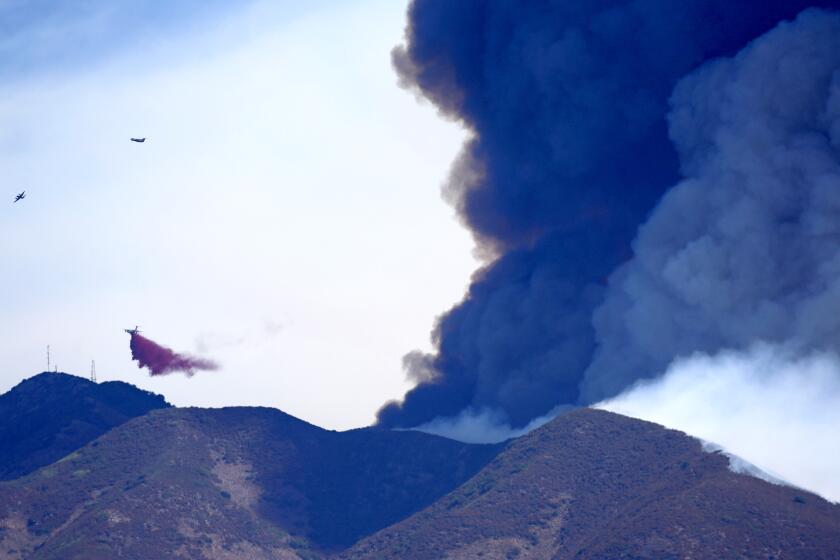Let the mighty liberal hawks soar
What comes after the twilight of the liberal hawks? Night of the liberal hawks? Return of the liberal hawks? Land of the liberal hawks?
I think we may be nearing a new dawn of the liberal hawks. The species accipiter liberalis, sought by hunters for its eagle wings and pigeon liver, has for many years been close to extinction throughout the North American continent. Yet things are looking up this summer as the troop surge, the public-interest vacuum created by Iraq fatigue and the total absence of a viable anti-war presidential candidate from either party have combined to provide the fair-weathered bird new airspace in which to try out evasive flight patterns.
Who are the liberal hawks? While bird watchers have never known their precise numbers, I aimed fire at a prominent cluster just prior to the 2004 presidential election, without bagging a single beast. (Liberal hawks don’t die, they just bore you to death with their vacillations.) At the time, my aviary consisted of Christopher Hitchens, Paul Berman, Thomas Friedman, Fred Kaplan, Kenneth Pollack, Fareed Zakaria, Jeff Jarvis, Andrew Sullivan and Michael Ignatieff.
This is a far-from exhaustive list of the Olympian penseurs who in 2003 joined what the New York Times’ Bill Keller famously dubbed the “I Can’t Believe I’m a Hawk Club.”
As it turned out, nobody else could believe they were hawks either, because, well, they weren’t. People in favor of the use of violence tend to understand that if you follow their policy prescriptions, you’ll get violence. The liberal hawks, though, were bred under special conditions in which war doesn’t kill people, democracy flows from a rifle barrel, tribal and religious differences vanish before the iron will of goodhearted secularists, and 3,000 dead soldiers over a 4 1/2-year period is considered a military disaster. Put to the iron test of the war they lobbied for, the liberal hawks washed out. All of the people on my list had turned against President Bush by the time he came up for reelection in 2004.
But there may be a new breeze in the air now that Pollack (whose 2002 book, “The Threatening Storm: The Case for Invading Iraq,” remains the central text of liberal hawkism) has taken a step toward retracting his own retraction. The same guy who in 2004 was condemning “the reckless, and often foolish, manner in which this administration has waged the war and the reconstruction” has recently turned bullish after a recent junket to Iraq with Brookings Institution senior fellow Michael E. O’Hanlon :
Here is the most important thing Americans need to understand: We are finally getting somewhere in Iraq, at least in military terms. As two analysts who have harshly criticized the Bush administration’s miserable handling of Iraq, we were surprised by the gains we saw and the potential to produce not necessarily “victory” but a sustainable stability that both we and the Iraqis could live with.
Does this signal a turnaround in the flight of the liberal hawks? Perhaps. A roundup of recent commentary about Iraq yields inconclusive but encouraging results. Zakaria, for one, has been seeing some good news:
Paul Brinkley, a talented deputy undersecretary of Defense, is trying to get the bulk of these state-owned factories up and running. He’s already restarted a bus factory in Iskandariya, south of Baghdad, and the experience has been telling. Hundreds of workers still in the area showed up for work, and the machines are now humming busily. There have been no attacks on the factory. “The insurgents attack people working for the police, army or the Americans. They do not want to alienate locals trying to make ends meet,” said one official working on the project.
Hitchens, whose wobbliness was always more heavily qualified than that of his aviary-mates, seems to be a dead-ender one week and a deserter the next. Here’s his most recent contribution to the war debate:
We can not only deny the clones of Bin Ladenism a military victory in Iraq, we can also discredit them in the process and in the eyes (and with the help) of a Muslim people who have seen them up close. We can do this, moreover, in a keystone state of the Arab world that guards a chokepoint -- the Gulf -- in the global economy.
If being a liberal hawk means always dodging blame, “Terror and Liberalism” author Berman’s footwork has been fancier than most. Here he is invoking what former liberal hawk Matthew Yglesias condemned as “the incompetence dodge” (which pins the disappointment of the war not on one’s own silly expectations but on alleged mismanagement by the Bush administration) while confidently looking forward to more invasions in the future, all of it wrapped up in a soul-stirring (OK, soul-deadening) rhetorical question:
I do not believe that, just because the Bush administration has bungled the promoting of democracy, we should abandon the very idea of democracy promotion. The United States is too powerful to be a neutral entity -- a giant Switzerland with no influence on anybody else. If we in the United States are not promoting democracy, we will end up willy-nilly promoting something non-democratic, which will either have to be dictatorship (the policy of the previous 60 years) or chaos (the result that we have actually achieved). Therefore, we had better promote democracy. How to do it, though, given everything that has happened?
And with New York Times columnist Friedman, whose glibness remains as vast as ever, we reach the end of liberal hawk resolution:
We owe Iraqis our best military and diplomatic effort to avoid the disaster of walking away. But if they won’t take advantage of that, we owe our soldiers a ticket home.
So that’s five out of a group of nine high-profile pundits who may be re-qualifying their positions on the war. The remaining deserters don’t even make up a fire team. Kaplan:
Judging from what we’ve heard so far about the new strategy for the war in Iraq, the eagerly awaited plan that Gen. David Petraeus and Ambassador Ryan Crocker have promised to deliver this September seems ambitious and intriguing but confusing in concept and highly impractical.
Jarvis, who to be fair has pretty much stopped talking about Iraq altogether:
If you haven’t seen it yet, here is a video about the Iraq Veterans Memorial, an online, video tribute made up of one-minute shows about the fallen from their loved ones, starting March 17.When I proposed a memorial for the World Trade Center, I suggested video tributes. Memorials need not be a place on the map anymore. It’s the memory, more than the monument, that counts.
The people who truly showed good judgment on Iraq predicted the consequences that actually ensued but also rightly evaluated the motives that led to the action. They did not necessarily possess more knowledge than the rest of us.
The honest thing for Bush to have done would have been to ask for reinstatement of the draft to provide the manpower to pursue his ambition. Obviously, this would have made clear that we cannot afford the cost of the Iraq war and undoubtedly put irresistible pressure on him to end this folly. I consider it an act of cowardice that Bush has refused to accept the logic or consequences of his policy in this way.
It’s always ghoulish fun to check out the latest liberal hawk lingo -- the hand-wringing, the shoutouts to Beltway gurus who supposedly offer a better model, the high dudgeon at having one’s ignorance revealed on a massive scale, the internecine slaughter, the calls for moral seriousness and the you-should-listen-to-me-because-I-was-wrong brand of self-regard.
But there’s a larger interest in the seesawing of the liberal hawks. Though they almost to a person think of themselves as guardians of the debate itself, their tedious moral struggles and fair-weather support encapsulate the national discussion in a country where a sizable majority supposedly wants to throw in the towel on Iraq, yet the democratic system is unable to field a viable presidential candidate who will openly call for giving up.
The essential unseriousness of the liberal hawks must be tracked over a five-year trendline. To put this as delicately as I can: Every non-idiot on the planet knew that invading Iraq was a bad idea. Having publicly argued otherwise should disqualify you from ever voicing any opinion on any topic ever again. Nevertheless, we as a nation went ahead with this war, and once you’ve made that decision, your only option is victory. Moral seriousness in this context means admitting the monstrous truth that we could continue to lose 1,000 soldiers a year for another 100 years, and that the logic of the original intervention demands we pay that price happily and continue to pay it until we get the results we want.
Or we admit defeat and leave immediately, without blowing any more gas about benchmarks or timetables.
Ironically, arguing for victory has become even more toxic than arguing for defeat. In the recent exchange in the L.A. Times between Princeton’s Anne-Marie Slaughter and the Atlantic Monthly’s Yglesias, both sides made powerful arguments, but what was most telling was that neither argued directly for the only logical outcome of their respective positions. If you believe in finding a consensus way forward in Iraq, you believe in victory. If you believe there is no consensus way forward, you believe in defeat. Either position can be argued with honor, but there is no honor among the liberal hawks. They want to keep believing that talk alone can constitute a way around that reality. And in that, they speak for the electorate to a greater degree than most of us would care to admit.
Tim Cavanaugh is web editor of The Times’ editorial page. Send us your thoughts at opinionla@latimes.com.
More to Read
A cure for the common opinion
Get thought-provoking perspectives with our weekly newsletter.
You may occasionally receive promotional content from the Los Angeles Times.










